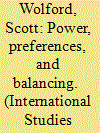| Srl | Item |
| 1 |
ID:
097497


|
|
|
|
|
| Publication |
2010.
|
| Summary/Abstract |
This article examines potential cost reductions in the market for balancing power by pooling all four German control areas. In a united control area both the procurement and the production of balancing power may be more efficient than in four separated control areas. Our data contain bids on energy procurement as well as balancing power flows in the period from December 2007 to November 2008. A reference scenario simulates the market results for secondary and tertiary balancing power. Subsequently, we simulate a united control area. We show that in the period under review the total costs of balancing power are reduced by 17%.
|
|
|
|
|
|
|
|
|
|
|
|
|
|
|
|
| 2 |
ID:
180121


|
|
|
|
|
| Summary/Abstract |
We analyze a drastic price increase in the German auction market for reserve power that did not appear to be driven by increased costs. Studying the market structure and bidding strategies using micro-level bidding data, we find a concentrated market with highly pivotal suppliers in an environment with completely inelastic demand and high entry barriers. We provide descriptive evidence that the price increase was triggered by an abuse of the “guess the clearing price” principle of discriminatory auctions via repeated pretended “bad guessing” of the marginal bid by the most dominant supplier. As intentional “bad guessing” of marginal bids is hard to prove, this suggests that the auction design is crucial for the competition authority's monitoring power – an issue that is often neglected in the discussion on the properties of auction designs. In fact, given regulatory threats, the deemed main advantage of pay-as-bid auctions over uniform price auctions and the popular belief that they reduce dominant suppliers' withholding incentives and diminish their ability to tacitly collude may be questioned in non-static settings. This suggests that pay-as-bid auctions may not necessarily reduce incentives for strategic capacity withholding and collusive behavior, but can even increase them when market power is high and demand inelastic, which is the case in virtually all energy markets.
|
|
|
|
|
|
|
|
|
|
|
|
|
|
|
|
| 3 |
ID:
131006


|
|
|
|
|
| Publication |
2014.
|
| Summary/Abstract |
Conflicts can expand when third parties perceive future threats from attackers, but how do they evaluate threats from coalitions rather than single states? Multilateral aggregations of power can generate fear in observers that coalitions may soon turn against them. Yet only some provoke opposition from observers, reducing their chances of success and expanding the conflict, while others do not. What accounts for this difference? I analyze a game-theoretic model of a third party's decision to intervene in an ongoing conflict and a coalition's decision to disband afterward, which is most likely when its preferences are diverse. When coalitions are powerful, an increasing diversity of foreign policy preferences reduces the probability that observer states balance against them, but when coalitions are weak, increasing diversity increases the probability of balancing. I find support for this conditional relationship between power, preferences, and balancing in a sample of 180 interstate crises from 1946 to 2000.
|
|
|
|
|
|
|
|
|
|
|
|
|
|
|
|
| 4 |
ID:
090077


|
|
|
|
|
| Publication |
2009.
|
| Summary/Abstract |
The present paper provides an empirical assessment of the effects associated with the reorganization of minute reserve markets in Germany. As the aim of the regulator is to assure a competitive market with transparent pricing, we analyze whether the recent policy reform has had an impact on the dynamics of minute reserve prices. Our results show that the level and volatility of positive and negative minute reserve prices decreased substantially. Furthermore, we provide evidence that the degree of integration between reserve and spot markets has increased. Overall, prices reacted to the policy change in a manner that is in line with the regulator's objective. The reform can thus be viewed as a step towards an efficient reserve market.
|
|
|
|
|
|
|
|
|
|
|
|
|
|
|
|